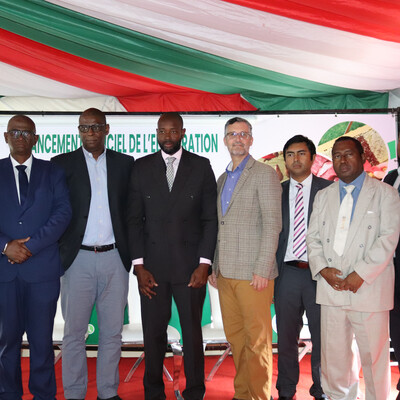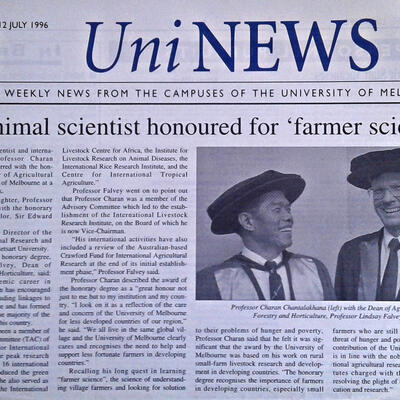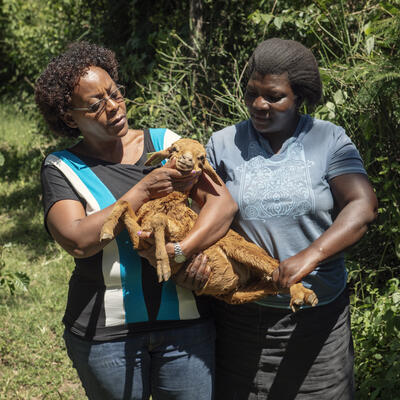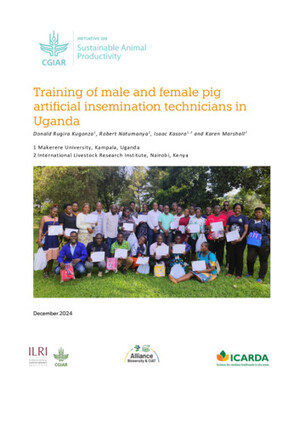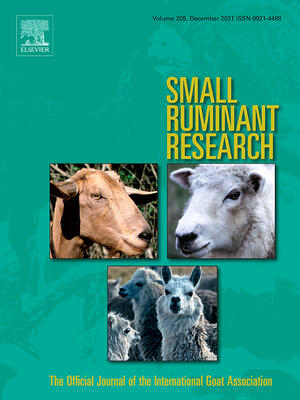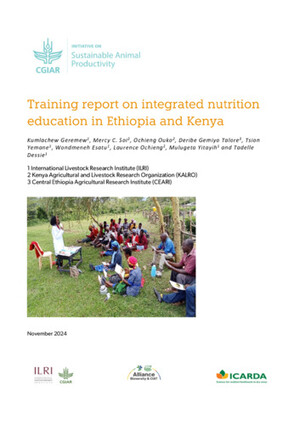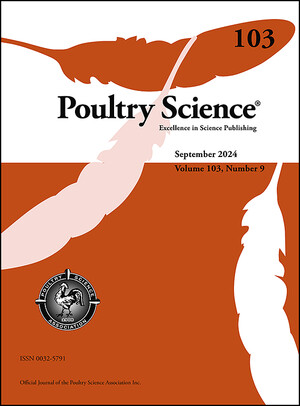
The Africa Dairy Genetics Gains team trains service providers and farmers on breeding practices and provides data capture tools
The Africa Dairy Genetics Gain (ADDG) program held a seven-day training to teach farmers and animal health service providers cattle estrous synchronization, fixed time artificial insemination and data collection. The training held from 20 June – 1 July 2022 was organized by the ADGG team comprising members from the International Livestock Research Institute (ILRI) and the program’s National Agricultural Research Services (NARS) partner in Kenya, Kenya Agricultural and Livestock Research Organization (KALRO), which was also the training venue.
The objectives of the training were to encourage the animal health service providers to register farmers and their animals for data flow and data collection, to develop the next generation of animals and to measure reproduction parameters of farmers’ herds. It was also aimed at educating farmers, so they make knowledgeable reproductive decisions for their animals as well as creating agents for data collection.
Artificial insemination (AI) provides access to genes from sires that have proven potential. This method also offers options among different sires to complement and correct characteristic flaws. In addition, it enables mating of cows at a lower cost because the expense of rearing a bull is eliminated.
During the training, service providers and farmers from Narok, Makueni, Nandi and Kajiado counties were taken through the steps of animal preparation for AI by ILRI’s Laurence Ochieng and project consultant Julius Owade. The modules included ovulation and conception, estrous synchronization, AI protocol, the process of animal selection, step by step AI practice, causes of AI failure and semen handling.
ILRI's Laurence Ochieng taking the group through a practical section of the AI training
Information and communications technology (ICT) has provided a great opportunity to crowd source animal performance data from smallholder farmers in Africa. ILRI’s Jennifer Gitau and Dominic Menju trained the participants on ICT data capture tools, Open Data Kit (ODK), large- and mediumscale interface and iCow.
ODK is a mobile data collection tool that does not need an internet connection to input data. The internet is only required when updating the form and submitting records to the aggregate server.
The large- and medium-scale interface is a web-based application customized as a self-service tool to support herd management and centralized data management. This tool requires a stable internet connection and is useful because it allows for batch uploads, a favourable feature for farmers with larger herds.
iCow, the final tool the participants were trained on, is an integrated mobile-friendly system of services and tools for farmers. It helps them upload information about their cows, easily monitor their progress and receive reminders and tips on dairy cow best practices.
‘Production data is important because it is matched to the animals’ genomic information and in that way helps with breeding decision-making amongst herds. Genomic evaluation is also a great way of determining relationships amongst herds and helps accelerate selection and use of superior animals,’ said Gitau
The week’s training was concluded with a handover ceremony where the ILRI team, led by Mwai Okeyo, handed over the program’s field activities to the KALRO team. The ADDG team spent the morning explaining to the participants the benefits of data collection, artificial insemination and genomics in their herds and taking a few questions. Afterwards, the farmers and service providers were presented with laptops and tablets to encourage and facilitate data collection and record keeping on dairy animals.
Topirian Kerempe from Kajiado Country received a laptop from ADDG project lead, Okeyo Mwai
‘Ninety-three per cent of our herds are producing below the expected . Through targeting of selected high production animals, gene discovery to identify superior brands and genetic gains through the data and information gathered, the ADDG program plans to improve the production potential of dairy animals in the region,’ Okeyo explained to the attendees, who included KALRO officials.
The participants were given an opportunity to provide their feedback on the training as the ceremony drew to a close.
‘As a young farmer, I am grateful for the lessons on modernizing our farming and the genetic information we have received. I have now learnt the importance of using crossbreeding to improve the gains of my cows. The database systems are going to be very helpful for keeping records and tracking production,’ said Lerionka Nkaitole from Ollontauwa Farm in Kajiado.
‘We appreciate the expertise and the wealth of information provided by this program. It is very timely for us, and we are committed to do our part to ensure that Narok will become an integral part of achieving the goals and targets of the project. Along with the Narok service providers, I confirm that we are ready to move at the required pace to actualize the project,’ Gideon Nkeyasha, Narok county director of veterinary services, told the gathering.

'The database systems are going to be very helpful for keeping records and tracking production,' Lerionka Nkaitole from Kajiado (left) tells Okeyo Mwai (right) during the handover of laptops session
The Nandi County Director of Veterinary services (CDVS), Dr Joseph Bitok, thanked ADDG for this initiative that will support and benefit farmers through the cooperatives. Noting that Nandi County officials were committed to working closely with the cooperatives, and said that the data capture tools they received will enhance data collection and storage for analysis to guide decision-making on breeding.
Resources on ADDG/further reading:
https://www.ilri.org/research/projects/african-dairy-genetic-gains







